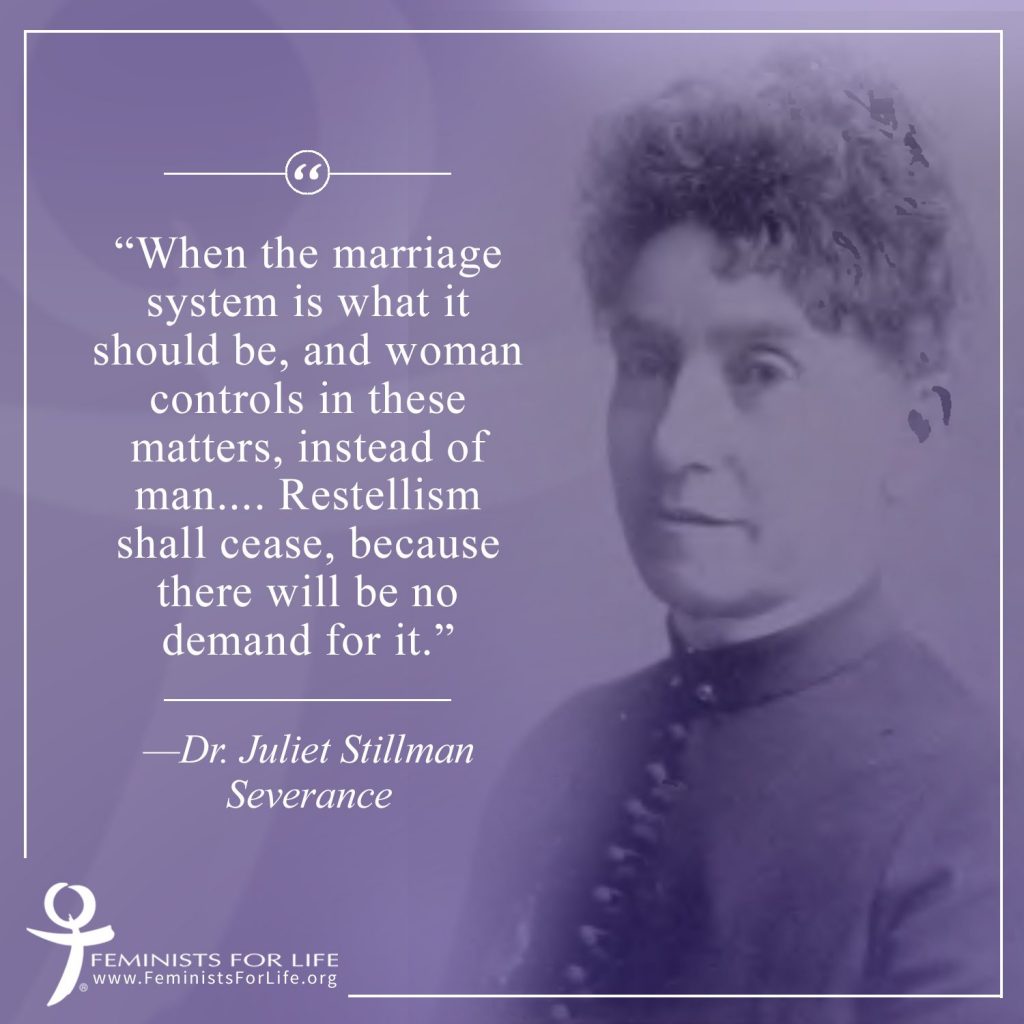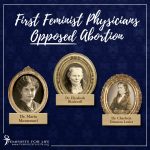
Contemporary feminists bravely challenge a belief that causes so much violence against women — the notion that woman are the property of men, expressed for centuries in the common-law doctrine that “man and wife are one, and that one, the husband.” The feminist movement has begun to create authentic choices for breaking the cycle of anti-woman violence. Feminists would be even more free to create and sustain such alternatives for women’s healing if more believed what our foremothers did: that abortion is part of the cycle of violence against women, and not a defense against it.
Let us consider the wisdom of the 19th-century healer Juliet Worth Stillman Severance, a relative of Quaker abolitionist and suffragist Lucretia Mott. While still in her teens, she became a schoolteacher and a well-known orator at women’s rights and anti-slavery conventions. According to Willard and Livermore’s biographical dictionary, Women of the Century (1893), she chose to study alternative medicine because it had helped her become “strong and vigor-ous” after a sickly childhood. She was a greatly successful doctor despite harassment from those who felt women had no place in medicine, and who decried her use of unconventional but more prevention-oriented and patient-centered treatments. She rejected the confining fashions of her time for simple, comfortable dress. She led several national labor organizations and eloquently opposed the death penalty. Anticipating late 20th-century feminists such as Carol Adams, Severance also practiced vegetarianism.
As Women of the Century wryly notes, Severance became “a radical of the radicals” whose tremendous “public work has not kept her from being a model mother and housekeeper.” All three of her children became well-known theatrical or musical performers. Her second husband supported her healing work. Severance wanted marriage and motherhood to be life-affirming choices for women, as shown by her article, “Is the Present Marriage System a Failure?” which appeared in the progressive Chicago newspaper Universe on Aug. 28, 1869.
Marriage should be a soul-union, not a curse … not a merging of one life into another, but … two individuals uniting their lives for mutual good and the good of humanity — it may be in reproduction, or it may be in giving birth to higher, nobler ideas, and outworking them in noble deeds and grand achievements …. There is not a child in a hundred that is begotten with the consent of the mother. As the present marriage system makes man the owner of woman — her legal master — she is expected to submit to his gratification …. When the marriage system is what it should be, and woman controls in these matters, instead of man … Restellism shall cease, because there will be no demand for it.
“Restellism” was a term for abortion, derived from the name of a notorious abortionist, Madame Restell. Severance’s article appeared immediately after the Universe printed an article titled “Where the Blame Belongs,” whose author, identified as “A Mother,” expanded upon the early feminist case against abortion:
I’m sick of hearing women berated for foeticide, when, seven cases in ten, the husbands and prospective fathers are more to blame than are the mothers. … when the hapless mother shrunk from the crime … he would laugh at her fears, and quiet her conscience by saying there was no life in the fetus until a certain number of months gestation had passed. Women have told me, with streaming eyes, that their husbands have insisted that they should destroy the life of their unborn babes …..
Similar scenarios play out in the lives of untold pregnant women today, because in many ways our culture still acts as if “man and woman are one, and that one, the man.” We will never fully break the cycle of violence against women if we adopt the parallel belief that “fetus and women are one, and that one, the woman.” Let us recognize with Juliet Stillman Severance and our other feminist foremothers that we cannot be completely healed of violence against women until human beings relinquish all claims of ownership in their intimate bonds — including their bonds with their unborn children.
Mary Krane Derr is co-editor of the anthology Pro-Life Feminism: Yesterday and Today.








